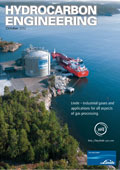Editorial comment
Last month I discussed the challenges facing the natural gas industry when it comes to exporting more natural gas from the US to global markets. This month I am sticking with natural gas, but moving on to an end use: natural gas as a transportation fuel. This is, as I’m sure you all know, another part of the natural gas industry facing many a hurdle.
Register for free »
Get started now for absolutely FREE, no credit card required.
As with every new development, policy, idea and plan there are pros and cons as well as challenges, and natural gas vehicles (NGVs) are no exception. Currently, the NGV sector is facing a chicken and the egg dilemma when it comes to refuelling infrastructure. The US automobile market, where 99% of the cars on the road rely on oil as a fuel, is a prime example of this.
Currently, there are only approximately 120 000 NGVs on US roads consuming 0.1% of US natural gas demand. The argument obviously suggests that if more infrastructure was built then refuelling of NGVs would be easier, and in some cases cheaper, so there would be more NGVs on the road. However, the investment and enthusiasm for such construction is lacking: as the counter argument proposes, if there were more NGVs on the road then it would be more profitable to build the refuelling infrastructure. In this instance one party is going to have to make a move or the stalemate will continue.
The cost of purchasing and running an NGV is initially very expensive, and converting a car to run on compressed natural gas (CNG) can be expensive also. This puts another barrier in the way of NGVs being adopted more widely. However, CNG is not the only natural gas based fuel available. Natural gas can be converted to methanol, which internal combustion engines can burn with only very slight modifications having to be made. Also, yes the initial cost of an NGV is currently more than an oil product car, however, the more you drive the cheaper it gets, and this will be greatly enhanced once the infrastructure is expanded. NGVs are also very beneficial for commercial companies as there are high net fuel saving potentials. But, the benefit of these will once again not be felt until the infrastructure is expanded, as there is the low range issue when it comes to heavy goods vehicles that run on CNG.
Fundamentally, replacing oil products with natural gas products can help reduce dependency on oil and thereby reduce the vulnerability of many global economies, as one cause of macroeconomic downturns is oil shocks. Also, natural gas based fuels have a far smaller social cost than oil based fuels, in particular, gasoline. The EPA have suggested that GHG emissions from CNG vehicles are approximately 25% lower than from gasoline vehicles. Yet, at the moment and until all stalemates are resolved, oil will remain the dominant vehicle driver.

